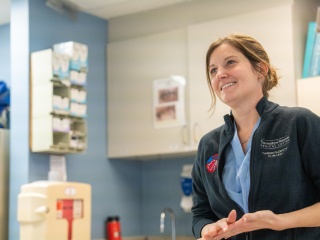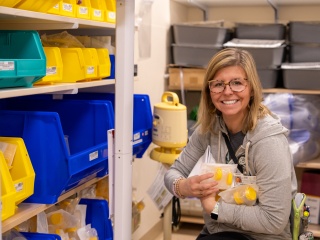
Pregnancy & Childbirth
Comprehensive, Personalized Care for You and Your Family
Having a baby is a special experience. As a parent to-be, it’s important to choose a medical team that supports you and respects your goals and preferences.
At University of Vermont Health, our experienced team is by your side at every step. You are central to the care we provide, actively involved in every decision along your pregnancy journey.
Our team recognizes the importance of individual choices during pregnancy and childbirth. Please know your questions are encouraged and you can turn to us at any time for help or reassurance. We welcome patients of all races, ethnicities, abilities, gender identities and sexual orientations.



Why Choose UVM Health?
As a leading pregnancy and childbirth program in the region, we offer:
- Dedicated team: Our pregnancy and childbirth teams include board-certified obstetricians, certified nurse-midwives, advanced practice providers and highly trained nurses. Every team member is focused on helping you have a healthy pregnancy and baby.
- Midwifery services: Midwives offer a holistic approach to pregnancy, labor and delivery and support natural interventions for patients who desire them.
- Advanced care when needed: If health issues occur during pregnancy, you have access to highly trained specialists, including maternal-fetal medicine physicians, and the latest technology in our maternal care center and neonatal intensive care unit (NICU).
- Personalized birth experience: Across our health system you’ll find private birthing rooms equipped with state-of-the-art technology and one-on-one nursing care during labor and delivery. Doula support is also available at some locations.
Your Pregnancy Journey
We provide comprehensive, personalized care at every step of your pregnancy. Patients across the region come to us for our expertise and patient-centered approach.
Treatments & Tests
I've delivered both of my children here and always felt listened to, safe and supported. The nurses were incredible and made me feel confident both during birth and caring for my newborns.
Your Personalized Pregnancy Care Plan
Check out MyChart Care Companion — a new tool with helpful reminders, quick check-ins and easy-to-read tips to help you manage your pregnancy and postpartum care. Ask your provider or login to MyChart to get started.

Awards & Certifications
March of Dimes
The March of Dimes awarded Golisano Children's Hospital at UVM Health an ‘A’ grade for perinatal services in their 2024 Report Card – making Vermont the only state to achieve an ‘A’ ranking in 2024 and setting a new benchmark for maternal and infant health across the United States.
Level 4 Maternal Care Center
University of Vermont Medical Center provides level 4 maternity care (the highest level) and serves as the regional referral center for hospitals across the region. Our maternal-fetal medicine team provides onsite medical and surgical care for patients with the most complex maternal conditions.
Level 3 NICU
A level 3 NICU designation means we have the personnel, equipment and organization to manage newborns with complex conditions and provide critical neonatal care. UVM Medical Center has the only NICU in Vermont and northern New York.
Newsweek: America's Best Maternity Hospitals
Newsweek has included UVM Health's anchor academic medical center and Level 1 Trauma Center that serves the region on its ranking of America’s Best Maternity Hospitals after assessing the quality of perinatal care, operative obstetrics, patient education and counseling, accommodation and service, and nurse and midwife staffing.
Locations near you
Share your location to see nearby providers and availability
353 Blair Park Road
Williston, VT 05495-7530
111 Colchester Avenue
McClure, Level 7
Burlington, VT 05401
115 Porter Drive
Middlebury, VT 05753
130 Fisher Road
2nd Floor
Berlin, VT 05602
75 Beekman Street
3 Main
Plattsburgh, NY 12901
111 Colchester Avenue
Main Campus, East Pavilion, Level 4
Burlington, VT 05401-1473
130 Fisher Road
MOB-A, Suite 1-4
Berlin, VT 05602-9000
111 Colchester Avenue
Main Campus, East Pavilion, Level 4
Burlington, VT 05401
206 Cornelia Street
Suite 105
Plattsburgh, NY 12901-2779
111 Colchester Avenue
Baird, Level 7
Burlington, VT 05401

